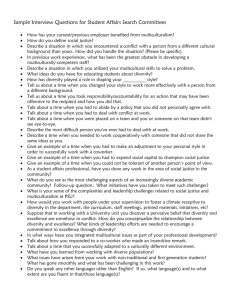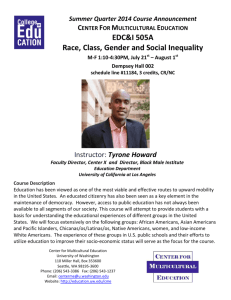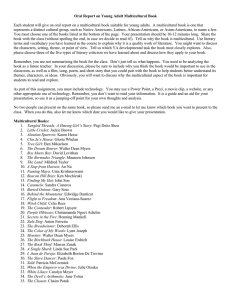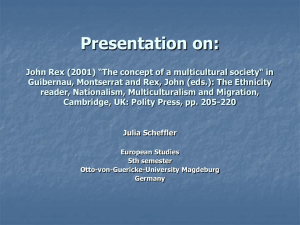Modul 12 Australian Multiculturalism
advertisement
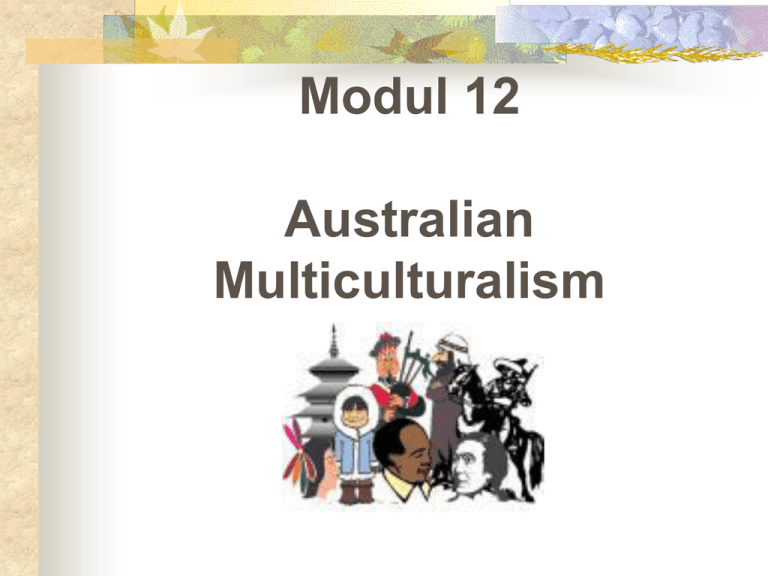
Modul 12 Australian Multiculturalism I. Six Key Factors in the Emergencies of Multiculturalism in Australia 1 Undeniable reality Australia = multicultural society 1 The Xenophobia was waning 1 The immigrant communities were becoming confident and articulate 1 Expansion of migrants and ethnic community groups cultural political issues 1 Labor Party Immigration Policy in 1972 to 1975 (Minister AI Grassby) 1 Social reform II. Immigration Policy : A Historical Perspective Before 1901 1 Racial exclusion 1 Predominantly British 1 1850’s : gold rush, non - British migrants increasing (China, German, Poland, America, Scandinavia, Hungarian) White Australia Policy (1901) 1 Before World - War II Racial exclusion (official) 1901 – 1940 : predominantly assisted British migrants and Southern Europeans (Italian and Greek) 1945 : ALP / Arthur Callwell as first immigration minister, planned immigration 1 Post – World - War II Populate or Perish Non - British :10 British Two – year – indenture labor, unskilled labor (non British), assisted (British) Displaced - persons (Baltic) Heterogeneity, not homogeneity Diversity by default, not by design III. Multiculturalism and Multicultural Policy Multicultural policy : public / government policy Multiculturalism : (everyday) multicultural policy The question : 1 Which countries implement this ? 1 When adopted by Australia ? 1 For whom ? 1 By whom ? 1 Why ? IV. Multiculturalism as Theory and Practice 1 Al Grassby (1973) : ‘A multicultural society for the future family of the nation’ : contribution of migrants 1 Zubrzycki (1977) : cultural pluralism 1 Jean Martin : structural pluralism (emphasis on access to economic and political structures) 1 Galbally (1977) : multiculturalism as practice 1 Blainey (1984) : multiculturalism as divisive 1 Jupp (1986) : reaffirm multiculturalism as public policy, proposed for structural pluralism V. Multiculturalism : Pros and Cons 1 Pros Capitalists Major political parties Labor shortages Defense / securities Growing market Capital Benefits, etc 1 Cons, right – wing : Blainey (1984), Knopflemacher Costly and divisive (publicly funded, minorities interests, disanglified) 1 Cons, left - wing : Jakubowicz, Lepervanche Multiculturalism as strategy for containment Effective means for social – control - initiated by the state VI. Multicultural Policy and Immigration Policy 1 Multicultural policy Introduced in 1973 after the failure of Assimilation and integration Assimilation Integration 1 Assimilation (postwar - mid 60s) Non - policy, mono culturalism, Anglo-conformity Migrants discard cultural baggage, assimilate Treating migrants as other Australians ‘New Australians’ Gap between rhetoric and reality Problems of settlement NESB Mid 60s special assistance for migrants 1 Integration (mid 60s - early 70s) Transitional Assimilation section integration section (1964) Ad hoc response, not systematic policy to migrant communities demand 1 Multicultural Policy (1972 – present) Guiding principle for migrant settlement Celebration of migrant cultural ‘trappings’ Diversity not homogeneity Cultural pluralism not monoculturalism Salad bowl, not melting - pot VII. Three Dimensions for Multiculturalism in Australia 1 Cultural identity The right of all Australian within carefully defined limits, to express and share their individual cultural heritage, including language and religion 1 Social justice The right of all Australian to equality of treatment and opportunity and the removal of barrier of race, ethnicity culture, religion, language, gender and place of birth 1 Economic efficiency The need to maintain, develop and utilize effectively the skills and talents of all Australian VIII. Multicultural Institutions 1 AIMA (Australian Institute of Multicultural Affairs), 1979 1 OMA (Office of Multicultural Affairs), 1987 1 ACMA (Advisory Council for Multicultural Affairs), 1989 1 NMAC (National Multicultural Advisory Council), 1994 1 DIMA (Department of Immigration and Multicultural Affairs), 1996 1 NMAC (new) (National Multicultural Advisory Council), 1997

